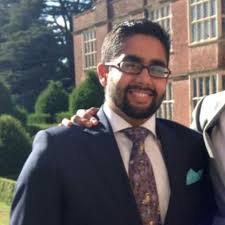Inside Scope on Medical Education
Are you an educationalist?
Or perhaps unsure as to where to turn if considering alternative pathways from clinical medicine?
Dr. Rohit Chitkara, valued member of the Medic Footprints community and Lead for the ACW Awards 2017, was unsure of his steps post F2, hence took some time out which included working in Medical Education. He eventually decided to transition to a non-clinical career as a Management Consultant at Price Waterhouse Coopers (PwC).
We catch up with him for an honest view of his experiences in this role including his thoughts on humility as a teacher and some new business ideas for the entrepreneurially minded..

Why did you elect to work as a Medical Education Fellow?
After a year working abroad, I was torn between staying and leaving medicine. I decided this would be a great opportunity to do something full time that I have always loved (teaching), with a good lifestyle, to decide whether I could forge a long term career in Medical Education.
The great lifestyle and excellent networking opportunities would allow me the time and space to figure out what I wanted to do with my career.
What core skills do you need to be successful in Medical Education?
From the teaching perspective you need to be convivial, have well rounded medical knowledge, confident, thick skinned and extremely adaptable. One thing that people don’t think about is the role in promoting professionalism and pastoral care for your students so you need to be a great communicator and emotionally intelligent. Sometimes there are subtle signs of serious underlying issues that may require your intervention to do the best for your students.
Humility is essential – there is always space for you to improve as a teacher and if you feel otherwise then I wouldn’t like to be taught by you.
Did you need any additional training?
It’s not essential, but in order to be a better teacher and to maximise your chance of getting a job as an Education Fellow, I would suggest at least doing some teaching workshops/courses and/or a postgraduate diploma/masters. There is a lot of beneficial things to learn.
Take us through an average day as a Medical Education Fellow?
It’s pretty chilled and that’s an understatement.
I usually teach in 3 hour sessions – 1.5h examination skills/bedside teaching and 1.5h teaching clinical skills. I usually do half a day of teaching and the other half is doing Med Ed research or audits/preparing for future sessions/administrative work e.g. timetables etc – whatever I want to do to be honest. As you are plugged into the university and its faculty, there are a ton of opportunities to grab, including lots of free courses.
Some people add in a clinical component to their job (a day or two a week) but I personally can’t think of anything worse… and I’ve seen some messed up things in my life.
What’s new and exciting in the Medical Education world?
I’m a fan of technology so I’d have to say its the usual stuff like using social media or virtual/augmented reality to teach everything from communication skills to anatomy.
What career opportunities do you think there will be for doctors interested in Medical Education in the future?
So many. When you are plugged into Faculty it’s really easy to be offered PhDs (either med ed or any speciality). You can create bespoke job plans in the future e.g. I know someone who will continue their speciality training program from next year with one day a week devoted to working in Med Ed for the university.
You could work at a university across a range of topics such as medical school interview/assessment development/curriculum development etc.
There is huge scope for private business within Med Ed and more and more are popping up – especially for post graduate education.
Either courses or question banks or even just developing a whole new device or piece of technology. And that could incorporate a whole host of skills/interests such as coding or UX design.
Any resources you’d recommend to find out more about how to get into Medical Education?
Check out the websites mededworld.org and asme.org.uk for an idea about various opportunities. The Royal Society of Medicine also have a variety of things on their website too if you check regularly.
Go to lots of Med Ed conferences (AMEE/ASME/TASME/ASPiH/AoME) and just talk to people, that’s the best resource by far.
Did Medical Education help in any way to secure your role in Management Consultancy?
Yes, the role gave me the time and flexibility to help figure out what I wanted to do, and enabled me to attend several relevant events and network with those who helped me out a lot in the end. I also had time to submit plenty of job applications!
Also because of the flexibility I could get involved with so many other projects such as Medic Footprints or Quality Improvement stuff which is directly relevant for management consulting.
Learning how to deal with difficult students or students with pastoral issues and the general day to day job provided lots of interesting examples for competency based interviews which were part of the management consultancy interview process.
For more information, check out our Career Guides for Medical Education and Management Consultancy.
Medic Footprints
Latest posts by Medic Footprints (see all)
- Alternative Careers for Doctors during COVID-19 - 5th April 2020
- Top 9 Coronavirus memes so far - 5th April 2020
- Portfolio Careers for Doctors 101: Utilising Key Strategies to Support your Life Goals - 30th January 2020